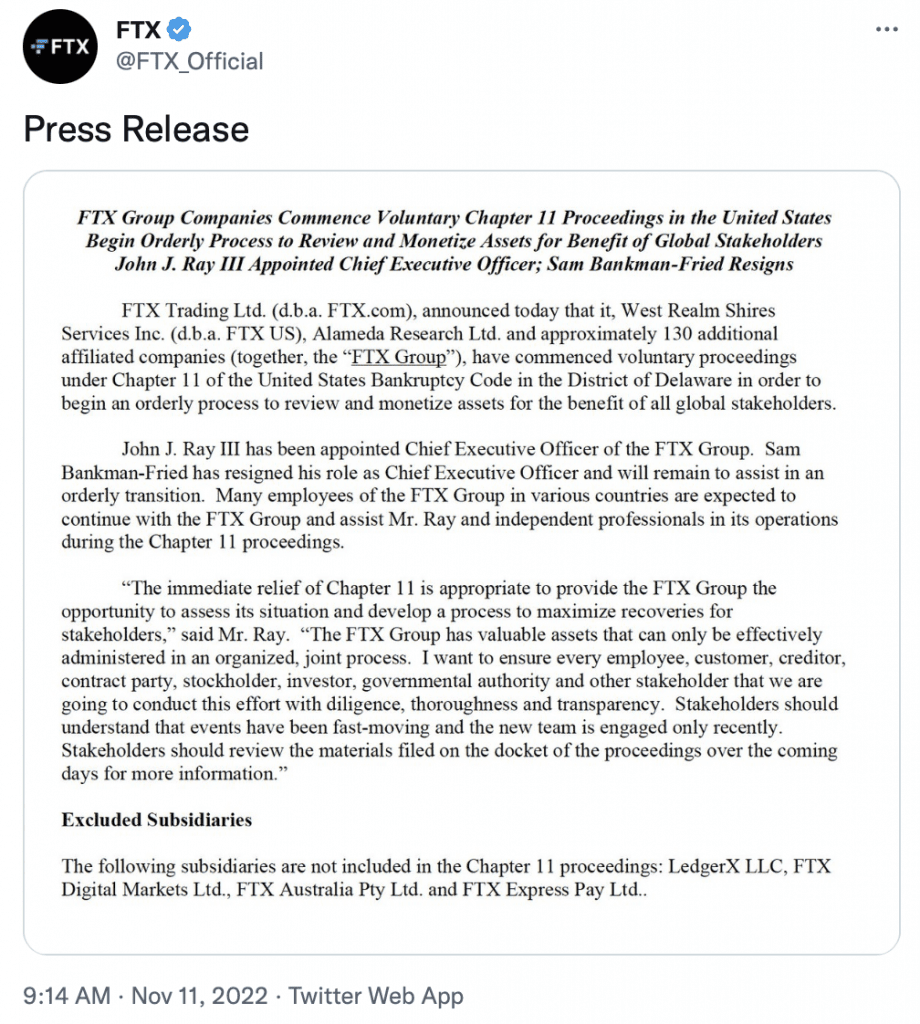Not long ago, FTX was one of the world’s largest trading platforms for cryptocurrencies. Founded in 2019 – and until recently, headed up – by Samuel Bankman-Fried, the Bahamas-based crypto exchange had a meteoric rise to prominence, and was valued at more than $30 billion earlier this year. All that has changed in the past two weeks. First, concerns emerged about links between FTX and Alameda Research, the asset-trading firm that Bankman-Fried co-founded in September 2017 with Tara Mac Aulay, including suggestions that customers’ funds have been transferred from FTX to Alameda. (30-year-old Bankman-Fried is the majority owner of both FTX and Alameda.) A few days later, rival firm Binance – the biggest crypto exchange – announced it would sell its holdings of FTT tokens, a crypto that reportedly comprises much of Alameda’s assets.
Panicked customers rushed to withdraw funds from FTX, and the company is now in the midst of a collapse, with a banner message on its website announcing it is “currently unable to process withdrawals,” and the company filing for Chapter 11 bankruptcy protection in the U.S. on November 11. (According to CNBC, in its 23-page bankruptcy filing, FTX indicates it has more than 100,000 creditors, assets in the range of $10 billion to $50 billion, as well as liabilities in the range of $10 billion to $50 billion.)

This is not the first such rapid disintegration we have seen in the loosely regulated world of cryptocurrency, and it is unlikely to be the last.
Even before FTX’s Chapter 11 filing, many firms had already written off the value of their stakes in FTX, thereby, making it difficult for Bankman-Fried to find investors willing to put in new funding. Changpeng Zhao-led Binance thought about taking over the troubled company outright, but ultimately decided against, citing concerns about allegations of misconduct and an investigation by the U.S. Securities and Exchange Commission. That prompted the price of FTT to plunge. A week ago, it was trading at $24, and as of November 11, it was at less than $4.
Cautionary Tales
Trading in “assets” with no underlying fundamental value on loosely regulated exchanges is always going to be a very risky endeavor. For many, it is likely to end in tears. Other kinds of asset are different. Company shares, for example, have a fundamental value based on the dividend (or at least an expected future dividend) paid from the company’s profits. Real estate has a fundamental value that reflects the rent the investor earns (or the owner-occupier saves). The value of a bond depends on the amount of interest it pays. Even gold at least has some practical uses, for jewelry, for instance, or electronics.
But so-called cryptocurrencies – such as Bitcoin, Ether and Dogecoin (and thousands more “alt-coins” and “meme-coins”) – have no such fundamental value. They are a game of pass-the-parcel, in which speculators try to sell them to someone else before the price collapses.
Unregulated financial institutions are prone to the equivalent of a Depression-style “bank run.” Once doubts emerge about their soundness, each person has an incentive to be early in the queue to withdraw their money before the money runs out. In a recent interview, Bankman-Fried gave a description of his business model that seems to rely heavily on funds injected by new investors, rather than on future returns based on the intrinsic value of the assets themselves.
The Fall of FTX & its Impact on Crypto
These events have further eroded confidence in the crypto ecosystem. Prior to the FTX fiasco, the “value” of cryptocurrencies had already dropped from a peak of more than $3 trillion to $1 trillion. It has now fallen even lower.
Just as a few stars, such as Amazon, emerged from the wreckage of the dot-com bubble, it is possible that only a handful of applications of the blockchain technology that underpins crypto have enduring utility. And the idea of an electronic form of currency is being realized in the form of central bank digital currencies. But as Hyun Song Shin, the chief economist of the Bank of International Settlements, put it, “everything that can be done with crypto can be done better with central bank money.”
John Hawkins is a Senior Lecturer at the Canberra School of Politics, Economics and Society at the University of Canberra. (This article was initially published by The Conversation.)











